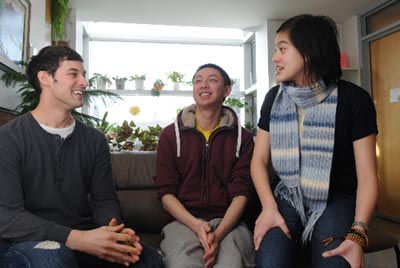 |
Zach Chartier, Austin Zhang and Raye Lee have started the HÂţ» Chinese Society. (Danny Abriel Photo) |
A bulletin board in Shao-Pin Luo’s office is covered with postcards from around the world—notes from former students on their post-degree travels. Most are written in English, but there are some in Chinese too, which impresses and delights their former professor.
“I love that my Chinese class meant at lot to them and that they keep in touch,” says a proud Dr. Luo.
HÂţ» began small with Chinese studies, offering one class in beginner’s Mandarin for 33 students five years ago. Since then, the program has grown considerably; there are now about 120 students taking Mandarin at the introductory, intermediate and advanced levels. As well, there’s a class in Asian Cinema taught by filmphile Simon Kow, professor of humanities at the University of King’s College, and a new class in Chinese culture to be introduced next year.
Minor program
Dr. Luo, the main impetus behind the program, has ideas for other classes too, including Asian-North American literature and Chinese literature in translation. She’d also like students to have the option of taking a minor in Chinese studies.
“The paperwork is done and we’re putting forward our application,” she explains. “If all goes well, we could have a minor program in place by 2012.”
Students have different reasons for wanting to learn Chinese: they may be interested in Chinese culture, and by extension, Chinese language; they’re business students with an eye on the ever-expanding Chinese market; they’re of Chinese descent, interested in learning the language of their forebears; or they’re “students with wanderlust,” as Dr. Luo puts it, interested in traveling in the world’s most populous country. One of her former students, Niko Bell, is doing just that. He’s cycling through rural China and writing a blog about his adventures. (SEE: )
“Learning Chinese is a challenge so you really need to have curiosity and imagination to take it on,” says Dr. Luo, whose first language is Mandarin. “My students jump right in ... it’s incredibly stimulating and inspiring for me as a teacher.”
Zach Chartier, a first-year economics major from Dundas, Ont., is one of those student interested in learning Mandarin to travel and conduct business. The chance to learn the language is one of the major reasons he chose HÂţ» over other universities. Now he’s organizing the HÂţ» Chinese Society, a student society which brings together Canadian and Chinese students for conversation and friendship.
International collaboration
“It’s a social thing. We get together and try out our Chinese,” he says. “Chinese can be difficult to wrap your head around if you’re an English speaker, so any practice you can get is helpful.”
HÂţ» Social Work Professor Michael Ungar is the leader of the International Resilience Project, a major, multi-year study on youth and the adversities they face. With one of the project sites located in Beijing, China, Dr. Ungar was keen to learn Mandarin, and took all three levels of language study at Dal as a student of Dr. Luo.
Although he admits without daily usage, his “Mandarin gets rusty pretty fast,” he was able to carry on a conversation with a taxi driver and exchange greetings with his Chinese colleagues the last time he was in Beijing. With another trip to China in the works, he'll get a chance to shake the rust off his language skills.
“With the emerging academic discourse around the world, it’s such a great resource to have these courses available at Dal,” he says.
LINK:
China Week at HÂţ»
Highlights include:
|
